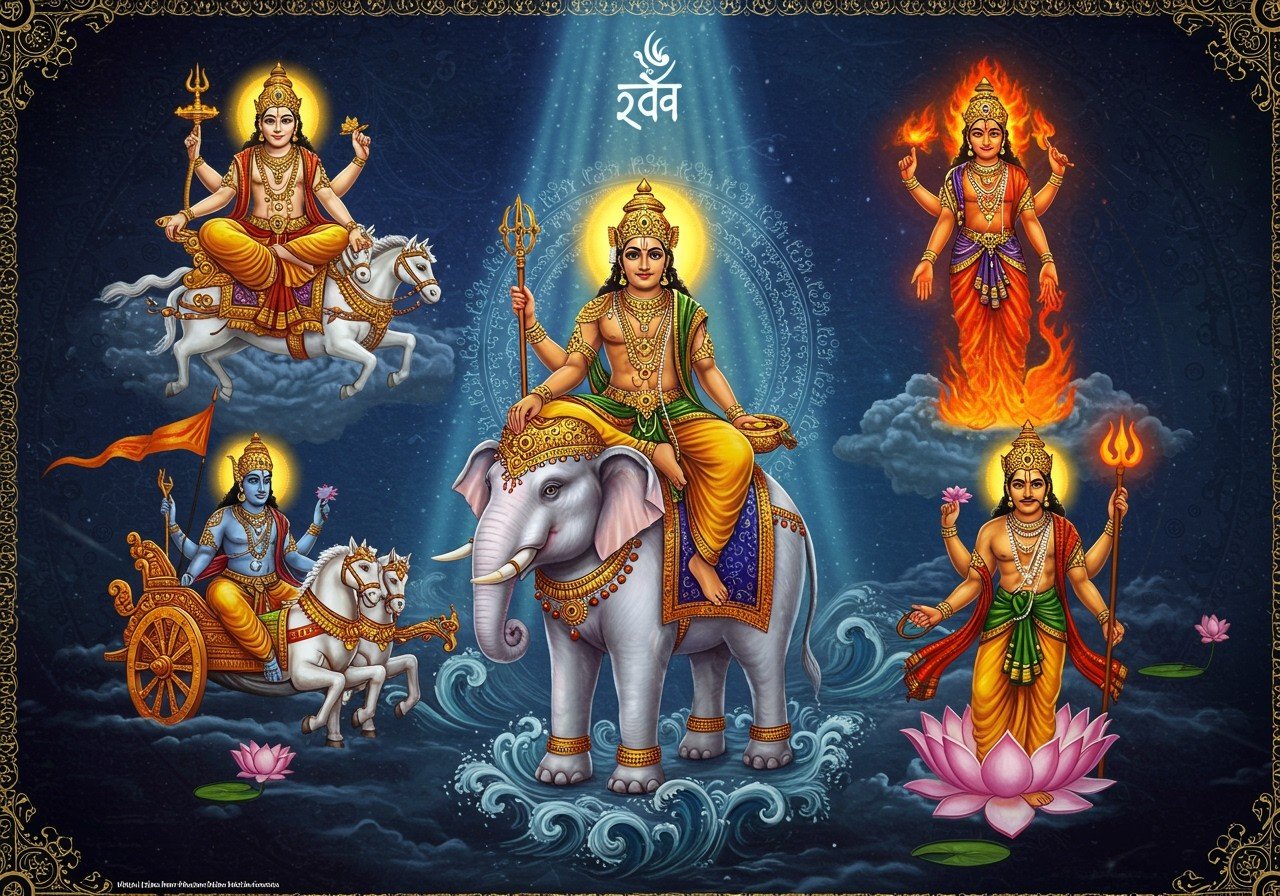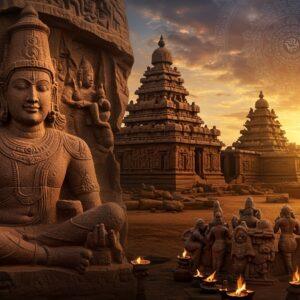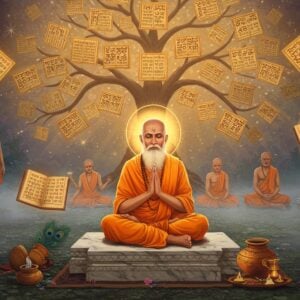
The Rigveda, one of India’s oldest sacred texts, dating back to around 1500 BCE, offers a glimpse into ancient Hindu spirituality. Its rich tapestry of deities and hymns reveals a complex cosmology and a deep connection with the natural world. These deities, central to Vedic culture, have significantly influenced later Hindu traditions. Preserved through oral tradition for centuries, the Rigveda continues to shape Hindu philosophy and cosmology.
The Principal Deities of the Rigveda
The Rigveda introduces a pantheon of deities, each with a unique role in the Vedic world. These divine beings, or ‘Devas,’ embody natural forces, cosmic principles, and abstract concepts. Let us explore some of the most prominent figures:
-
Indra: The king of the gods, Indra commands thunder, rain, and war. He is celebrated for his heroic deeds, particularly his victory over the demon Vritra, which released the life-giving waters. Numerous hymns praise his strength and prowess in battle, making him a central figure in Vedic mythology.
His bravery and power make him a source of inspiration and a symbol of triumph over adversity. Indra’s association with rain also connects him to fertility and prosperity, making him a vital deity for ancient communities.
-
Agni: The god of fire, Agni acts as a messenger between humans and the divine. He is invoked in rituals, carrying offerings to the gods and mediating between the earthly and celestial realms. Agni’s presence in both domestic and sacred fires highlights his importance in Vedic life.
Agni is revered as a source of warmth, light, and purification. He is seen as a benevolent force who guides and protects, playing a central role in both daily life and religious ceremonies.
-
Varuna: A powerful deity associated with cosmic order and moral law, Varuna oversees the sky and the celestial ocean. He is described as upholding rita, the cosmic order, ensuring that justice and balance prevail. Hymns dedicated to Varuna often emphasize his wisdom and omniscience.
Varuna’s role in maintaining order and his association with the vastness of the sky reflect the ancient Vedic understanding of the universe and the importance of living in harmony with cosmic principles.
-
Soma: A unique figure in the Rigveda, Soma represents both a sacred plant and its intoxicating juice, as well as the deity associated with it. The Soma ritual, involving the preparation and consumption of this elixir, was central to Vedic religious practices. The hymns describe Soma as a source of inspiration, immortality, and spiritual insight.
Soma’s intoxicating properties were believed to elevate consciousness and provide access to divine realms. The Soma ritual was an important part of Vedic religious life, reflecting a desire for spiritual transcendence and connection with the divine.
Other important deities in the Rigveda include Surya (the sun god), Ushas (the goddess of dawn), and Rudra (the god of storms and the wild). Together, these deities represent a complex and interconnected understanding of the natural world and the divine.
Indra: The Mighty Warrior
Indra, the king of the gods, stands out as a formidable warrior. He is renowned for his battles against demons and his role in maintaining cosmic order. His weapon, the thunderbolt, symbolizes his power over the elements. Explore our collection of Lord Shiva Murtis and other divine figurines at poojn.in.
Agni: The Sacred Flame
Agni, the god of fire, plays a crucial role in Vedic rituals. He is the intermediary between humans and gods, carrying offerings to the heavens. Poojn.in offers a wide selection of camphor and incense, essential for honoring Agni and other deities.
Varuna: The Upholder of Rita
Varuna, the guardian of cosmic order, embodies justice and righteousness. He ensures that the natural laws are followed and that balance is maintained in the universe. Our blog post on Dharma and Karma in Hinduism further explores these concepts.
Soma: The Elixir of Immortality
Soma, both a plant and a deity, represents spiritual transcendence and the pursuit of immortality. The Soma ritual was a significant aspect of Vedic worship, symbolizing the connection between humans and the divine. Learn more about Hindu rituals in our dedicated blog post: Hindu Rituals: Significance and Importance.
Frequently Asked Questions About Rigvedic Deities
What is the significance of Rigvedic deities? The Rigvedic deities represent natural forces and embody fundamental principles of the cosmos. They provide a framework for understanding the world and humanity’s place within it.
Are there dedicated temples for Rigvedic deities today? While many ancient deities like Indra and Agni no longer have dedicated temples, their influence persists in contemporary Hindu traditions and rituals. Their stories and symbolism continue to inspire and guide spiritual seekers.
How are the Rigvedic deities connected to modern Hinduism? Although some Rigvedic deities are less prominent today, their legacy persists in the rich tapestry of Hindu beliefs and practices. Their stories, symbolism, and associated concepts continue to shape Hindu thought and spirituality.
Connecting with the Rigvedic Deities Through Poojn.in
Poojn.in, India’s leading provider of spiritual and cultural goods, offers a wide range of products to support your exploration of the Rigvedic tradition. From sacred texts to ritual items, we have everything you need to connect with these ancient deities and deepen your spiritual practice. Discover our curated collection of turmeric, aguru, and other traditional items to enhance your spiritual journey. Visit poojn.in today and embark on a deeper exploration of Vedic wisdom.
Disclaimer: Product availability is subject to change. Please check our website for the most up-to-date information on stock and pricing.


